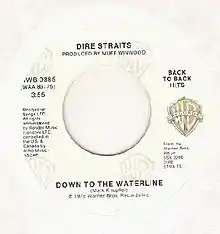Down to the Waterline
"Down to the Waterline" is a 1978 song written by Mark Knopfler and first released by Dire Straits as the first song on their debut album, Dire Straits. It was also included on the demo tape that the band sent to Charlie Gillett, which led to their first recording contract.[1][2] It was subsequently released as the B-side of the "Water of Love" single.
| "Down to the Waterline" | |
|---|---|
 Label from "Back to Back Hits" series issue, on flip side of "Sultans of Swing" | |
| Single by Dire Straits | |
| from the album Dire Straits | |
| A-side | "Water of Love" |
| Released | 1978 |
| Recorded | 1978 |
| Genre | Rock |
| Length | 3:55 |
| Label | Vertigo (UK) Warner Bros. (U.S.) |
| Songwriter(s) | Mark Knopfler |
| Producer(s) | Muff Winwood |
The lyrics of "Down to the Waterline" tell of a brief sexual tryst.[3] Cary Darling of Billboard praises the song as superior to the other love songs on side 1 of Dire Straits, including "Water of Love."[3] According to Mark Knopfler's brother and fellow Dire Straits member David, the song's imagery is based on Mark's memories of walking along the River Tyne at night under the lights with his girlfriend when he was a teenager.[1] Darling praises the lyrics as "incisive" but "never cliched." Darling also praises the moody foghorn sound that opens the song, Knopfler's "quick finger picking" guitar playing and the tightness of the band on this song.[3] Author Joel McNally describes how "the band appears out of the fog" to start the song, noting that the effect is "not hokey."[4] High Fidelity also commented on the song's "tender, passionate, and yet unsentimental" erotic imagery.[5]
Hi-Fi News & Record Review described the song as "bouncy and punchy."[6] The Rolling Stone Album Guide commented on the song's "galloping groove."[7] Montreal Gazette critic Bubert Bauch claims that "Once Upon a Time in the West", the song that opened Dire Straits' second album, Communiqué, sounded very similar to "Down to the Waterline", which opened their debut album.[8]
"Down to the Waterline" later appeared on Dire Straits live album Live at the BBC and on the Dire Straits "Best of" compilation album Money for Nothing.[9]
References
- Oldfield, M. (1984). Dire Straits. Sidgwick and Jackson. pp. 33, 42–49. ISBN 9780283989957.
- Erlewine, Stephen Thomas. "Dire Straits". Allmusic. Retrieved 17 August 2011.
- Darling, C. (27 January 1979). "Closeup". Billboard Magazine.
- McNally, J. (7 April 1979). "'Dire Straits' Nearly Perfect". The News and Courier. p. 18C. Retrieved 21 April 2014.
- High Fidelity. 29 (1–6). 1979. Missing or empty
|title=(help) - "Hi Fi News". Link Publishing. 2003. Retrieved 21 April 2014.
- DeCurtis, A.; Henke, J.; George-Warren, H., eds. (1992). The Rolling Stone Album Guide (3rd ed.). Random House. p. 200. ISBN 978-0-679-73729-2.
- Buach, H. (9 June 1979). "'Comumnique' Puts to Rest Concern over Dire Straits". The Montreal Gazette. p. 22. Retrieved 21 April 2014.
- "Down to the Waterline". Allmusic. Retrieved 17 August 2011.